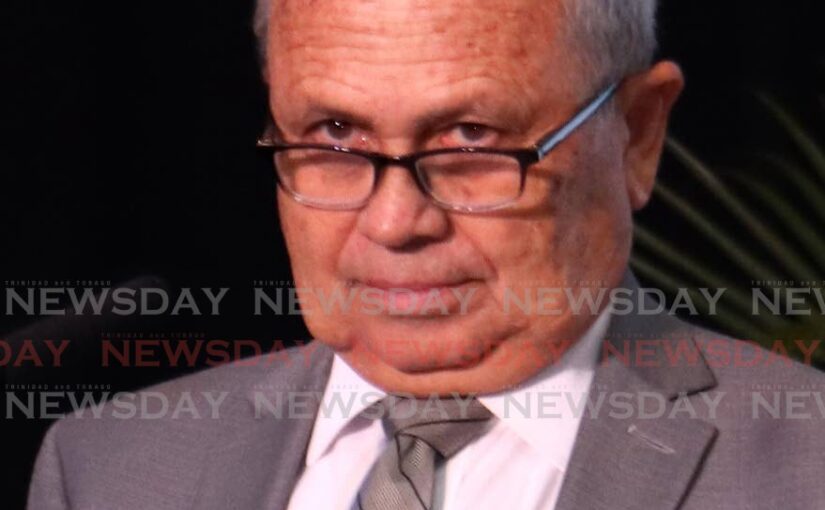Chief Secretary Farley Augustine is calling on Parliament to "do the right thing" and give Tobago "the real deal" when it comes to its autonomy. The...
Vous n'êtes pas connecté
- English
- Français
- عربي
- Español
- Deutsch
- Português
- русский язык
- Català
- Italiano
- Nederlands, Vlaams
- Norsk
- فارسی
- বাংলা
- اردو
- Azərbaycan dili
- Bahasa Indonesia
- Հայերեն
- Ελληνικά
- Bosanski jezik
- українська мова
- Íslenska
- Türkmen, Түркмен
- Türkçe
- Shqip
- Eesti keel
- magyar
- Қазақ тілі
- Kalaallisut ; kalaallit oqaasii
- Lietuvių kalba
- Latviešu valoda
- македонски јазик
- Монгол
- Bahasa Melayu ; بهاس ملايو
- ဗမာစာ
- Slovenščina
- тоҷикӣ ; toğikī ; تاجیکی
- ไทย
- O'zbek ; Ўзбек ; أۇزبېك
- Tiếng Việt
- ភាសាខ្មែរ
- རྫོང་ཁ
- Soomaaliga ; af Soomaali
Rubriques :
 Maroc - NEWSDAY.CO.TT - A la Une - 26/Sep 07:35
Maroc - NEWSDAY.CO.TT - A la Une - 26/Sep 07:35
Revenue decline: Tobago’s costly problem
Dr Rita Pemberton THE DECLINE and ultimate crash of the sugar industry in Tobago had lasting consequences for the island and its administration. The old planter elite which remained obsessed with preventing the acquisition of power by the emerging social groups and its determination to keep the Africans as estate labourers refused to accept the changes that were inevitable. This fear of being deposed by the rising middle sector and African ascendency into the political and administrative realm of the island and the challenges to keep the island’s economy buoyant were the two-headed monster which the old planter elite faced. When faced with falling demand for Tobago’s poor-quality sugar and the low prices the sugar attracted, rather than attempt to diversify the economy, the planters clung to the antiquated methods of sugar production and expended their efforts on battles to force the labourers to accept what in effect was the maintenance of the work regime of enslavement. Their focus was on cost reduction of their operations with the expectation that worker compliance would be obtained. However, post-Emancipation planter/worker relations on the island reflected the strong desire of the workers to attain their own objectives as they functioned within the restrictions of the island’s labour market and, assisted by the misfortunes of the sugar industry, they managed to carve opportunities to increase their earnings while the sugar industry stagnated. The major problem Tobago faced was a decline in revenue, which provided the means for financing the island’s administration and essential operations. Revenue was based on trading activity which generated customs and excise duties, but the decline of the sugar industry meant a decline in trading activity and, therefore, a decline in revenue to the island’s Treasury. In addition, the sugar industry was based on expenditure which anticipated returns from the sale of sugar on the London market. The ships which took sugar from Tobago were required to bring back imported items which were on the planters' shopping list. These items were paid for by advances from the agents in London, but since planters had not adjusted their demands to keep in line with their earnings, some estates became heavily in debt. Several were put up for sale and when this failed some were simply abandoned. Therefore, in addition to revenue loss by reduced trade, there was also loss of revenue from the land and house taxes and licences which were not paid for the abandoned estates. The revenue deficit problem plagued the island’s administration across the second half of the 19th century when the Assembly used the disaster of the 1847 hurricane and the revenue shortage as the basis for requests for assistance from the imperial government, which usually involved funding to deal with what they termed a “shortage of labour” on the island and for development projects. Several proposals were made to flood the labour market with immigrants, including immigrants from India, but the imperial government bluntly refused to provide financial support for immigration schemes which the island could not afford. Also, the imperil government was not prepared to fund development projects unless they were seen as essential, and if given the assistance would be in the form of a loan. Revenue shortage also affected the ability of the Assembly to pay salaries, to which the directive from officials in London was to reduce salaries and reduce the number of employees by giving each dual responsibility. This set the Tobago administration on a cost-cutting exercise which did not result in a significant change in the island’s debt problem, and which left no room for undertaking essential development activities. But the imperial government added to the problem by reducing its own cost by first indicating that the colony must bear the cost of the governor’s salary and subsequently ordering the appointment of a lesser-paying position to the person who would head the island’s administration – a commissioner. The government of Tobago was abolished at the end of 1888 and when the joint colony of Trinidad and Tobago was created on January 1, 1889, Lorraine Geddes Hay became the first Commissioner of Tobago. One of the first issues that faced Commissioner Hay was the continually declining revenue. Although this was blamed on the creation of the joint colony, the reality was that, with the crash of the main creditors to the sugar industry in 1884, there occurred a further reduction of imports and exports related to the reduced number of estates in operation and the low cultivation of most of the operating estates, which was affected by the raging conflicts between metayers and employers. In addition, low sugar prices and the reduction of shipping duties in 1882 contributed to the decline in customs duties. The closure of 30 of the island’s 32 distilleries significantly reduced the amount of excise duties – seven shillings ($1.68) and six pence (12 cents) per gallon – that were collected. Furthermore, in addition to the deficit caused by abandoned estates, several of the large landowners were unable to pay their taxes. This caused a further decline in the amount of house and land taxes paid to the Treasury. Also, from 1885 there was a decrease in the payment of licence fees to the Treasury due to an increase in export of animals to Trinidad by members of the middle and labouring sectors. At the end of the 80s, Tobago’s financial outlook did not appear to be very promising because there had been a reduction in every source of revenue and there were no new revenue sources on the horizon. By 1892, the Tobago Treasury was considered bankrupt, some salaries had not been paid and the Treasury was £7,000 ($33,600) in debt. Commissioner Hay, who was unable to keep up with the challenges of his office, succumbed to the lure of alcohol and was ineffective for most of 1892. The island’s financial crisis became more acute during his administration, which would affect the administrative arrangements for the union of Trinidad and Tobago and the perception by some in the larger island that Tobago was a dependent and likely to be a burden on Trinidad.was likely to be a burden on Trinidad. The financial crisis cost Tobago reputational damage. The post Revenue decline: Tobago’s costly problem appeared first on Trinidad and Tobago Newsday.
Articles similaires
Chief Sec urges Parliament: Do the right thing, give Tobago real autonomy
Chief Secretary Farley Augustine is calling on Parliament to "do the right thing" and give Tobago "the real deal" when it comes to its autonomy. The...
PNM Tobago leaders urge support for autonomy bills: ‘A step forward for Tobago’s future’
The leaders of the People’s National Movement (PNM) in Tobago say just because Tobagonians are not getting everything they want immediately out of...
Tobago billan illusionof autonomy
THE EDITOR: I write to express serious concerns about the Tobago Island Government Bill, 2021, which claims to increase Tobago's autonomy while...
A hard no on Tobago bills
THE EDITOR: During the recent budget debate, the Prime Minister promised that in this session of Parliament he would bring back the Tobago...
THA plans for 2025 carnivals, weighs $$ support
Secretary of Tourism, Culture, Antiquities and Transportation Tashia Burris says the Tobago House of Assembly (THA) will have to carefully consider...
No medals for Trinidad and Tobago at Caribbean Road Cycling Champs
Trinidad and Tobago's four-man cycling team were unable to finish among the medals at this year’s Caribbean Elite Road Championships, which...
THA tourism secretary: Tobago on world’s radar
SECRETARY of Tourism, Culture, Antiquities and Transportation Tashia Burris said Tobago is on the world's radar as one of the premier tourism...
Doubling down on Tobago autonomy
MANY issues might decide the next general election. Tobago autonomy is one of them. Farley Augustine’s shift in tone as it relates to two pending...
Attz: Trump presidency could impact Trinidad and Tobago in different ways
ECONOMIST Dr Marlene Attz said a Donald Trump presidency will likely have mixed effects on Trinidad and Tobago's economy – several positive and...
Les derniers communiqués
-
Aucun élément









